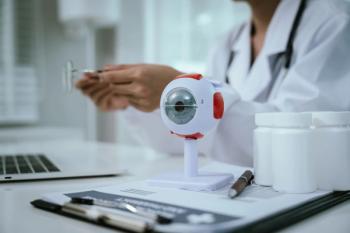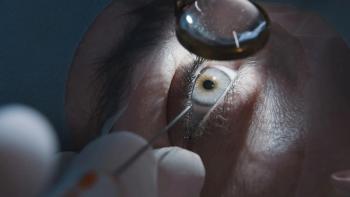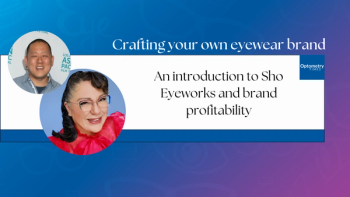
Blog: Too many cooks in the kitchen spoil the broth
The views expressed here belong to the author. They do not necessarily represent the views of Optometry Times or Multimedia Healthcare.
“Too many cooks in the kitchen spoil the broth” is an apt aphorism to describe the current fragmented state of the U.S. system.
I recalled the saying recently as I talked on the phone with two relatives from Virginia, who found themselves bebopping from one eyecare practitioner to the next in two different states.
I was having lunch with my wife when I saw my cell phone caller ID light up with a 540 area code.
I told her, “That could be somebody wanting to ‘buy our house,’ threaten me with jail if I don’t call ‘the IRS’ back about my ‘tax fraud,’ or a relative back home with bad news.”
I let it go to voice mail. Turns out, it was the latter-my aunt, one of the smartest and saviest businesspersons I've ever known.
“Mahhhhk,” she intoned with her beautiful Blue Ridge Mountain, Scottish-Irish lilt, “call me back, please. I got an ah probl’m I wanted to discuss widge ya.”
She’d had cataract surgery in one eye 11 years ago, and I recall talking with her then about the Fuchs’ dystrophy her ophthalmologist had diagnosed her with.
Fortunately, my aunt’s somewhat low endothelial cell count hadn’t caused any major problems back then, and she’d come out seeing fine.
But now she’d had cataract surgery in the other eye about 4 weeks prior to our conversation, and with it, new problems.
“I think the dachta’ called it ‘Mahup-daht-fingahprint dystruhfah,’ and that I had some scah tissue from it. I just ain’t seein’ as clearly afta’ surgery with this ah as I did with the first un’.”
Unbeknownst to her cataract surgeon, she had gotten jittery and decided to cross state lines for a second opinion-somehow managing to snag an appointment with a highly regarded academic ophthalmology program and a corneal specialist whose name I immediately recognized.
“Well, what did he say?” I asked.
“Not much of anythang. He referred me to another dachta’.”
“Another corneal specialist?” I asked incredulously.
“Yup. Only this one is a youngin’, fresh outta school.”
My professional opinion
It’s tricky business, trying to give sound eye advice over the phone when you don’t have access to patient charts or images of some sort to look at.
But friends and relatives have been calling me up and doing this to me for years, so I’ve got mad case history skills now.
After delivering the usual caveats about the limits of blind, long-distance diagnoses, I dived in with a few targeted questions.
Are you having any pain in the eye in the morning? No (good, probably no corneal erosions).
Do you know what your vision is? No.
Then what percent do you think it is of your good eye? “About 90 percent” came the reply (that sounded pretty good to me).
Are you still on your postop eye drops, and did the first corneal specialist give you anything different to use? Finishing up, and no, he didn’t.
She was scheduled to go back to her original cataract surgeon soon, and her appointment with the second corneal specialist was booked for a few weeks later.
I told her that-with two corneal dystrophies to deal with-it might take a little longer for this eye to see its best, an extended period of eye drops and/or ointment of some sort might be needed, and at some point, a “good refraction”(dear readers, hold that thought…).
But the best advice I felt I gave her was to ‘fess up to the cataract surgeon that she’d gotten a little spooked and skipped out on him for a second opinion and to ask him to contact the corneal specialist she’d originally seen so they could better (or really, just begin) to coordinate her care together.
Maybe that second corneal consult and trip across state lines wouldn’t be necessary if folks would just get together and talk.
Is that too much to ask, and is that going to happen?
It shouldn’t be, but color me skeptical.
My sister’s experience
A few days later, my older sister sent me a text message with two different glasses prescriptions she’d recently received.
A glaucoma specialist had written the first one in minus cylinder. A pediatric ophthalmologist (stay with me) had written the second one, one month later, in plus cylinder.
Even transposed, the prescriptions were a fair amount apart. Upon questioning, my sister confirmed that both refractions were performed by ophthalmic techs and not checked by either ophthalmologist (no judgment, just the facts).
Ironically, she received both prescriptions from the same highly regarded academic ophthalmology program that my aunt had sought out.
Her final text: “Call me when you get a moment! :-) ”
Sigh.
So here’s how this batch of broth got botched.
My sister has a complicated retinal condition, and she goes to the retina clinic there and receives excellent care.
Somewhere along the line, a tech measured her intraocular pressure (IOP) in the low 20s, and the retina specialist referred her to a glaucoma specialist. I remember this well because she had texted me and I had asked her to call me about that, too.
As I suspected then: false alarm. But while at the glaucoma clinic, my sister mentioned her “blurry, double vision” and received a glasses prescription with the added bonus of a consult to the pediatric clinic for a strabismus evaluation.
Not surprisingly, the pediatric ophthalmologist apparently found no strabismus.
Judging from the two different prescriptions and my sister’s confirmation that her “double vision” was actually monocular, I surmised that she probably had some uncorrected astigmatism, early cataract, or both.
So what did I tell her?
I told her that I had no way of knowing if either of the prescriptions was close to correct-but if I were in her shoes, I wouldn’t get either of them filled. She is a talented pianist and seamstress with precise near demands, and I didn’t want her possibly spending hundreds of dollars on glasses that might not work.
“What should I do, then?” she asked.
I told her she could either drive all the way to Alabama, crossing three state lines in the process, and let me nail the refraction; or, she could go see my classmate from the University of Alabama at Birmingham (UAB) who practices in Roanoke, tell my friend I sent her, and ask that the OD touch the phoropter and no one else.
I know, I know-yet another doctor’s visit. But I’m just trying to clean up this hot mess before it gets even worse.
Is it any wonder that the U.S. ranks so high in healthcare costs and so low in population health outcomes compared to many other countries with saner and more rational systems?1
I don’t know what the ultimate answer is, but more cooks running around the kitchen with no supervision isn’t it.
Instead, we may need more alpha dog “Master Chefs” who can oversee the whole process, ride herd on the staff, and make sure everyone is performing their proper roles and mixing the right ingredients to maximize success.
Is there anyone out there interested in applying for the position?
References:
1. Papanicolas I, Woski LR, Jha AK. Health care spending in the United States and other high-income countries. JAMA. 2018 Mar 13;319(10):1024-1039.
Newsletter
Want more insights like this? Subscribe to Optometry Times and get clinical pearls and practice tips delivered straight to your inbox.













































